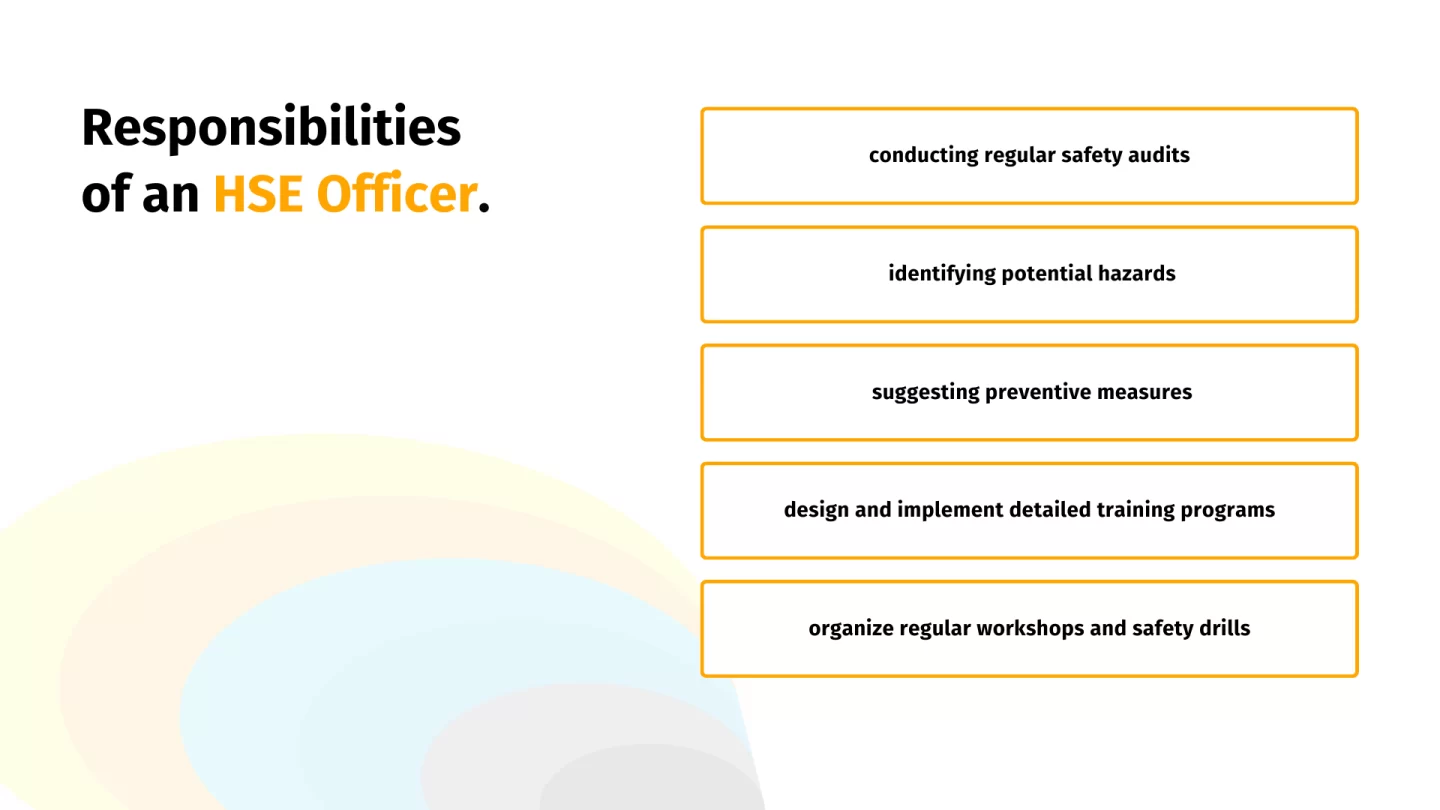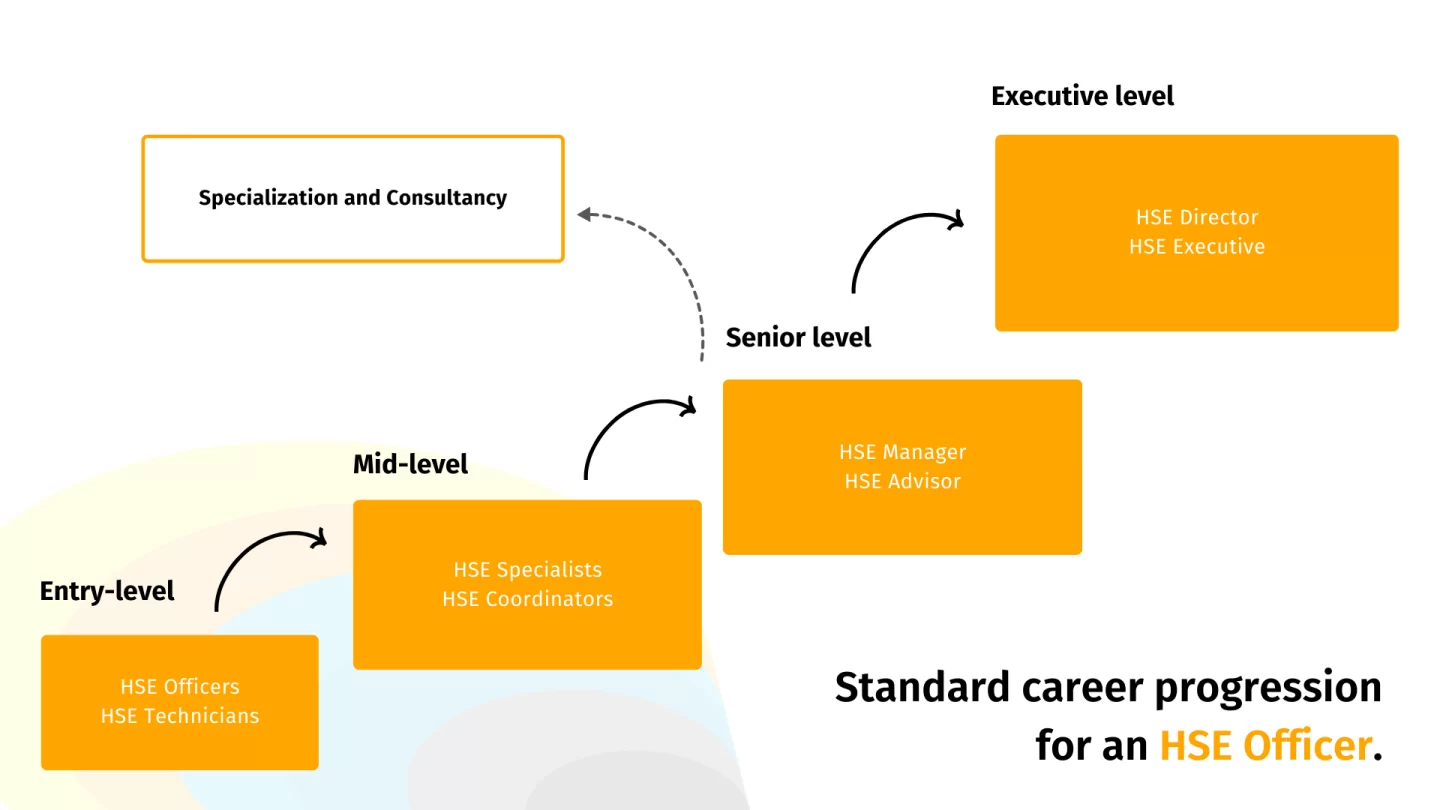If you are interested in becoming an HSE (Health, Safety and Environment) Officer at an energy company, here is a guide to help you get started.
Why work as an HSE Officer
An HSE Officer is responsible for ensuring that an energy company complies with health, safety, and environmental regulations. Thus, HSE Officers are crucial parts of any company in the energy industry. HSE Officers lead the charge in protecting the security of workers, with concrete results. In short, an HSE officer is the person that ensures that nothing goes wrong, by diligently verifying that everyone and everything complies with the safety norms of the task at hand.
What does an HSE Officer do?
They develop and implement safety policies and procedures, conduct risk assessments, and provide training to employees to prevent accidents and ensure compliance with regulations. Insuring compliance with procedures makes HSE officers accountable for the safety of the people working, which is a heavy responsibility to bear.
HSE Officer salary and benefits

As shown by data collected in January 2024.
Compensation for safety officers goes beyond mere figures; it symbolizes how much an organization values safety. Sufficient pay not only draws in skilled experts but also encourages them to perform exceptionally in their positions.
As you may know, salaries vary depending on the experience, education and region you are located at, that is why we are taking a look now at the numbers per area.
In the USA and Canada, the salary for an HSE Officer ranges from USD 60,000 to 90,000 annually. When we look at the United Kingdom, workers can expect to receive GBP 35,000 to 45,000 per year. On the other side of the world, in Australia, HSE Officers seem to be highly favoured as they receive the amount of AUD 50,000 to 70,000 every year.
In the case of emerging economies, such as India where the industry is growing steadily, they typically bring home INR 300,000 to 600,000 annually.
However, salary is not the only benefit that HSE Officers enjoy on the job. Many others such as, diverse work environments since HSE officers often work in a variety of settings, from offices to industrial sites. This diversity can make the job interesting and challenging. Job security also comes in handy. Due to the essential nature of the role, HSE officers often enjoy a higher degree of job security. The latter also translates to a high demand for skilled HSE professionals across various sectors that come due to increasing awareness and regulatory requirements for workplace safety.
HSE Officer skills and requirements
To become a Health, Safety, and Environment (HSE) officer, a bachelor’s degree in occupational health, safety, or a related field is typically preferred, although an associate degree may suffice for some roles. Key certifications include OSHA training, NEBOSH, or IOSH. Practical experience, either through work or internships, is beneficial. Industry-specific knowledge, particularly regarding safety regulations and practices, is essential. Continuous professional development through workshops and seminars is important to stay updated.
Becoming an HSE Officer at an energy company requires a strong understanding of health, safety, and environmental regulations, as well as the ability to develop and implement policies and procedures to ensure compliance. They also must be natural leaders ready to instruct others on safety mechanisms. An ability to respond well to emergencies is important too. With the right skills and qualifications, a career as an HSE Officer can be rewarding and provide opportunities for growth and advancement within the energy industry.
Responsibilities of an HSE Officer
At an energy company, an HSE Officer’s responsibilities extend beyond just developing safety policies and procedures. They are actively involved in implementing these policies across various departments, ensuring a safe working environment. This includes conducting regular safety audits, identifying potential hazards, and suggesting preventive measures. Their role is pivotal in emergency preparedness and response, where they lead in creating and testing emergency response plans. More specific duties are highly relevant to the exact environment the Officer works in.
HSE Officers design and implement detailed training programs tailored to the specific needs of the energy industry. These programs cover a wide range of topics, including workplace safety, emergency response, handling hazardous materials, and operating machinery safely. The training is often a mix of theoretical knowledge and practical, hands-on sessions, ensuring employees not only understand the safety protocols but can also apply them in real-world scenarios. Furthermore, HSE officers also reinforce safety practices when they organize regular workshops and safety drills. These activities help employees stay alert to potential hazards and understand the correct procedures in emergency situations. Drills, such as fire evacuations or spill response exercises, are crucial in preparing staff for unexpected events, and HSE officers design these exercises.

Locations of HSE Officer jobs
As we said before, Safety Officers are an essential part of many organisations, specially in the energy industry. They have to go where the industry goes and that means that both offshore and onshore jobs, in the office or the field are possible. Additionally, there are regions where HSE Officer jobs are increasing in demand, such as India and Brazil. The latter can also represent opportunities for a higher salary too.
Career progression and growth opportunities
The career progression for a Health, Safety, and Environment (HSE) officer in the energy industry unfolds through several distinct stages, each with increasing responsibility and complexity.
At the entry-level, individuals start as HSE Officers or Technicians, where their primary responsibilities include conducting safety audits, training staff in safety procedures, and ensuring compliance with relevant regulations. This phase is crucial for building a foundational understanding of workplace safety and environmental protection principles.
Moving to the mid-level, HSE professionals advance to roles such as Specialists or Coordinators. Here, they take on more complex tasks such as developing and implementing safety programs, analyzing accident data to identify trends, and providing HSE guidance to management. This stage involves a deeper engagement with safety strategies and policies, requiring a more analytical and proactive approach.
The senior level sees HSE professionals stepping into roles like Manager or Advisor. In these positions, they are responsible for strategic oversight, managing entire HSE programs for specific sites or regions, developing company-wide safety policies, and leading teams of HSE staff. This level is characterized by a shift towards leadership, with a focus on strategic implementation of safety and environmental practices.
At the executive level, in larger organizations, opportunities arise to assume positions such as HSE Director or Executive. These roles involve shaping the overall HSE strategy of the company, liaising with regulatory bodies and stakeholders, and ensuring that the company’s HSE practices align with its strategic objectives.
Additionally, there is the option of specialization and consultancy. HSE professionals can choose to specialize in specific areas like offshore safety, renewable energy, or environmental management. Experienced professionals often become consultants, offering their expertise to a range of clients.
Career advancement in this field is typically supported by ongoing education and professional certifications. Networking and maintaining a strong track record in improving safety performance are also crucial for progression.

Work environment and culture
The work environment and culture for HSE officers are predominantly safety-focused and compliance-oriented. These professionals work in diverse settings, from offices to industrial sites, and collaborate across departments to implement and enforce safety protocols. Their role involves staying updated with evolving safety regulations and technologies, making adaptability and continuous learning essential. While challenging due to the high responsibility for preventing accidents and environmental incidents, it is also rewarding, as they play a crucial role in safeguarding the well-being of employees and the environment. The job demands strong communication skills and often involves a mix of office and fieldwork.
How to Become an HSE Officer at an Energy Company
To become an HSE Officer in the energy industry, pursue a relevant degree in environmental science, engineering, or health and safety. Gain industry-specific experience through internships or entry-level positions. Obtain certifications like NEBOSH or IOSH. Develop a strong understanding of industry regulations and safety standards. Enhance your skills with ongoing professional development and stay informed about the latest trends and technologies in health, safety, and environmental management. You also need strong communication and interpersonal skills.
Certifications in relevant areas, such as OSHA 30-hour General Industry or Environmental Management Systems (EMS). In addition to these qualifications, it’s important to stay up-to-date with the latest regulations and industry best practices by attending conferences, workshops, and training sessions.
Benefits of working as a HSE officer
Working as an HSE Officer in the energy industry offers numerous benefits. Firstly, it provides the satisfaction of ensuring workplace safety and environmental protection. As well as contributing directly to the security and well-being of your team and society as a whole. Furthermore, this role offers diverse and dynamic challenges, requiring continuous learning and adaptation, which keeps the job intellectually stimulating. HSE Officers often have opportunities for professional growth and development, enhancing their expertise and career prospects. The position also tends to be financially rewarding, reflecting the level of responsibility and expertise required. Additionally, it offers the chance to work in various locations and environments, broadening one’s professional and cultural experiences.
Drawbacks of working as an HSE officer
Of course, the number one concern of any HSE Officer is the responsibility and accountability associated with their work. The weight of these duties can be the cause of a lot of stress for HSE officers. That is why it is of utmost importance that, as an HSE Officer, you feel confident and in control of everything that is going on in your area of responsibility.
Current HSE officer vacancies
WTS Energy is the right place to take your career to the next level. With opportunities for talent in reputed energy companies worldwide, be part of exciting projects powering the energy transition. Whether you are looking for a job in the Oil and Gas, Renewables, or Nuclear industry, our recruiters will take your needs to the utmost care.
